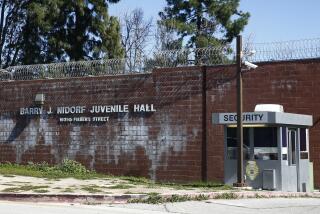Prisoners Get Food Stamps, U.S. Study Finds
More than 1,000 convicted criminals from Los Angeles have continued to participate in the federal food stamp program after being sent to jail or prison, potentially costing taxpayers millions of dollars, according to a federal investigative report made public Monday.
In some cases, according to the report by the U.S. General Accounting Office, inmates’ families have illegally received an extra $68.89 a month because benefits were calculated on the assumption the inmate was still eligible for food stamps and was living at home. In other cases, inmates were ripping off the government by having someone else pick up and use their food stamps--either a federally approved representative or persons who fraudulently represented themselves as food stamp recipients, the report said.
“We’re not saying it’s all fraud,” said Keith Oleson, assistant director of the GAO’s San Francisco regional headquarters. “There are some who are cheats and some who aren’t. We don’t make that judgment.”
In its study of four food stamp programs across the country, the GAO concluded that 12,138 inmates or their families fraudulently received $3.5 million in food stamp money in fiscal 1995.
About one-tenth of the cheats were from Los Angeles County--280 County Jail inmates and an additional 900 felony convicts who received aid through the county while serving time in prisons around the state. However, the Los Angeles County system was only studied from August through December 1995 instead of the entire year, so “this is the minimum side of the coin, not the maximum,” Oleson said.
The GAO reported that although the money is but a small part of an estimated $1.7 billion a year nationally in annual waste and fraud in the federal welfare program, it is one problem that can and should be corrected immediately.
“The participation of ineligible individuals undermines the credibility of the food stamp program, and results in overpayment,” the watchdog agency concluded.
The illegal payouts result from food stamp recipients not informing the government they have been convicted of crimes and are thus ineligible for continued benefits. As well, Los Angeles County and other government entities failed to weed out the criminals from their food stamp rolls so their benefits or their portion of their family’s benefits could be eliminated.
To come up with its findings, the GAO cross-referenced computer databases of state and local inmates with databases of people receiving food stamps.
Oleson said his agency’s conservative approach in tallying up the taxpayer losses indicates there may be a lot more fraud that no one knows about.
Within hours of the report’s release, outraged Republican members of Congress said they would move to curb what they described as a rampant and “shameful” rip-off of taxpayers funds as early as today. “It’s outrageous that scarce public resources, which are allocated to those in need out of human compassion and kindness, are going unfairly to some households whose only advantage is that one of its members broke the law and went to jail,” said Rep. Robert Smith, (R-Ore), who heads the House Committee on Agriculture that oversees the massive federal food stamp program.
“Taxpayers have a right to expect that their taxes are wisely spent,” Smith said in a statement, “and improperly enriching the households of the incarcerated is not what taxpayers have in mind.”
Sen. Dick Lugar (R-Ind) said the report makes it clear there is “a breakdown in the system, allowing millions of dollars to be paid out illegally. . . . The food stamp program provides a safety net for millions of people. We cannot allow fraud and abuse to undermine the program.”
Lugar, chairman of the Senate Committee on Agriculture, Nutrition and Forestry, said he would introduce a bill that would encourage food stamp program administrators such as Los Angeles County to run computer matches of data, cross-referencing food stamp participants and verified inmates.
Mary Robertson, who oversees implementation and policy development for Los Angeles County’s food stamp program, said, “We would be supportive of doing those computer matches,” Robertson said.
More to Read
Sign up for Essential California
The most important California stories and recommendations in your inbox every morning.
You may occasionally receive promotional content from the Los Angeles Times.










